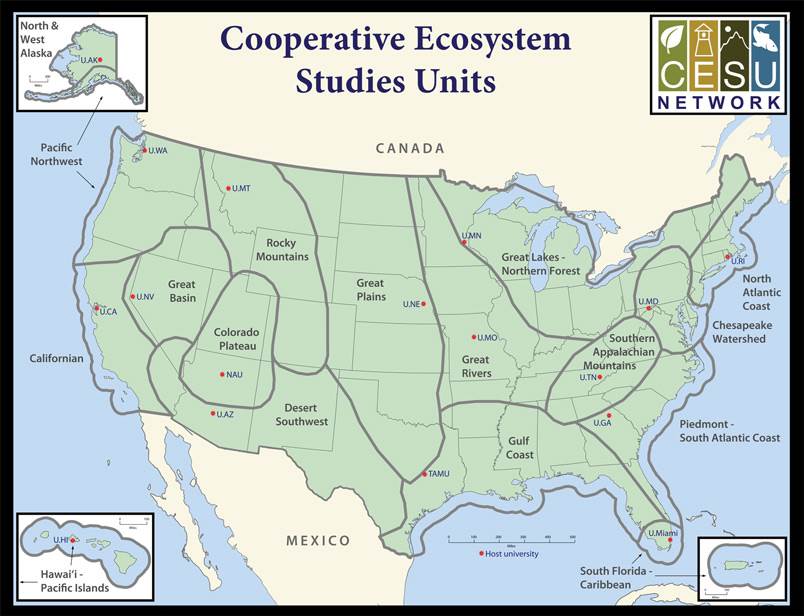Piedmont-South Atlantic Coast Cooperative Ecosystem Studies Unit
The Piedmont-South Atlantic Coast Cooperative Ecosystem Studies Unit (PSAC-CESU) is a network of 10 federal agencies, 22 universities, and 11 non-governmental partners who aim to provide relevant research, education, and technical assistance for stewardship of natural and cultural resources in the piedmont and coastal region of the southeast United States. The University of Georgia‘s Warnell School of Forestry and Natural Resources serves as the Host Institution for the PSAC-CESU, which was established in 2003.
Members of the PSAC-CESU benefit from a streamlined task agreement process that facilitates collaborative partnerships and funding mechanisms between federal agencies, academic institutions, and non-governmental partners. Our federal partners provide funds to non-federal partners to support projects that are of relevance and benefit to the funding agency, the participating partners, and the public. By facilitating work that involves the biological, physical, social, and cultural sciences, the CESU aims to address resource issues and interdisciplinary problem-solving at multiple scales and in an ecosystem context at the local, regional, and national level.
Additional Resources
- CESU National Network website
- Administrative Guidance Documents and Financial Assistance Forms
- Agreements and Amendments
- Fact Sheets
Learn More
The Cooperative Ecosystem Studies Units (CESU) Network is a national consortium of federal agencies, tribes, academic institutions, state and local governments, nongovernmental conservation organizations, and other partners working together to support informed public trust resource stewardship. The CESU Network includes more than 475 nonfederal partners and 17 federal agencies across seventeen CESUs representing biogeographic regions encompassing all 50 states, the District of Columbia, and U.S. insular areas. The CESU Network is well-positioned as a platform to support research, technical assistance, education, and capacity building that is responsive to long-standing and contemporary science and resource management priorities.
The seventeen CESUs bring together scientists, resource managers, students, and other conservation professionals, drawing upon expertise from across the biological, physical, social, cultural, and engineering disciplines (from Anthropology to Zoology) to conduct collaborative and interdisciplinary applied projects that address natural and cultural heritage resource issues at multiple scales and in an ecosystem context. Each CESU is structured as a working collaborative with participation from numerous federal and nonfederal institutional partners. CESUs are based at host universities and focused on a particular biogeographic region of the country.


